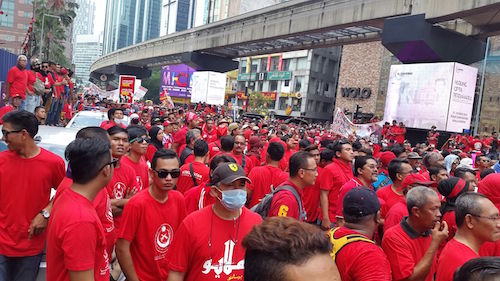The Economist: Malaysia ‘playing with fire’ with red-shirt rallies
(Malay Mail Online) – Malaysia risks facing more serious clashes with an upcoming red-shirt rally amid pro-Malay sentiments that will distract Putrajaya from implementing difficult but necessary reforms, The Economist said.
The London-based publication said in an analysis that Malay communalism grew quickly last July after US paper the Wall Street Journal reported that almost US$700 million (RM2.6 billion) was deposited in Prime Minister Datuk Seri Najib Razak’s private accounts shortly before Election 2013, leading to a sudden Cabinet reshuffle where critics from within Umno were dropped and “pro-Malay hardliners” elevated.
“Most ordinary Malaysians reject racial rhetoric. But with more red-shirt gatherings in the offing, the risk of more serious altercations is rising,” said The Economist in the article titled “Playing with fire” published today.
“The spats are distracting the government from tricky and badly needed social and economic reforms. They are also worrying ethnically pluralist neighbours, such as Singapore, which frets about infection.
“As this year’s chair of ASEAN, a group of Southeast Asian states eyeing closer integration, Malaysia had pledged to promote a more modern and prosperous region. It is sinking deeper into its past,” The Economist added.
Sungai Besar Umno chief Datuk Jamal Md Yunos, who was one of the key personalities in the September 16 #Merah169 rally that saw racist insults hurled at ethnic the Chinese, said Wednesday that “red-shirt” protesters may return to Petaling Street this weekend and “riot” if the authorities do not crackdown on alleged sales of counterfeit products in Chinatown.
The police were forced to use water cannons to prevent protesters from entering Petaling Street during the pro-government September 16 rally that was attended by tens of thousands of Malays garbed in red shirts.
Traders in Chinatown are reportedly considering closing tomorrow for fear of the possible riot, despite police assurances of security.
The Economist noted that Malaysian politics have long been race-based and pointed out that Malay incomes have increased rapidly following pro-Bumiputera policies implemented after the 1969 race riots that saw killings and Chinese shops burned.
It cited statistics from the Economic Planning Unit that showed the average monthly gross household income of the Bumiputera rising to RM5,548 last year. The Indians and the Chinese respectively had a mean monthly gross household income of RM6,246 and RM7,666 that year.
Although Najib appeared to be in favour of rolling back pro-Bumiputera policies that critics say have merely enriched the elites upon assuming office in 2009, Umno championed Islam and the Malays instead after Barisan Nasional (BN) lost the popular vote in the 13th general election that saw MCA and MIC losing heavily.
“As well as losing interest in reforming discriminatory policies, it has become less disapproving of religious types appalled by pop concerts, dog-petting and women’s gymnastics. It is playing along with Islamists who are trying to introduce strict sharia punishments in a devout northern state,” said The Economist.
Najib reportedly defended the #Merah169 rally that was organised to counter the Bersih 4 rally for institutional reforms, which appeared to be mostly attended by the Chinese, and was quoted as saying by Bernama that the “Malays also have rights” after being “slapped” four times.
The previous three Bersih protests, however, have seen a large Malay presence.


